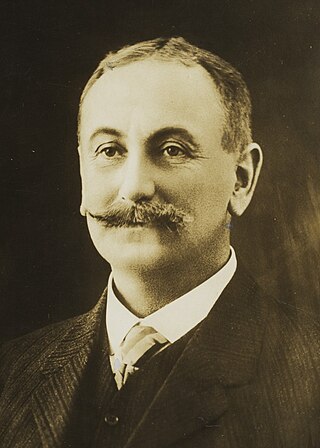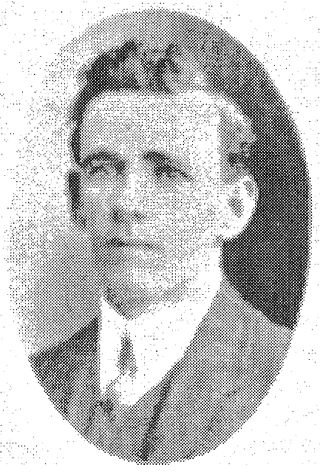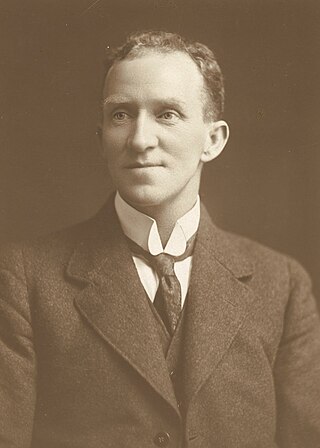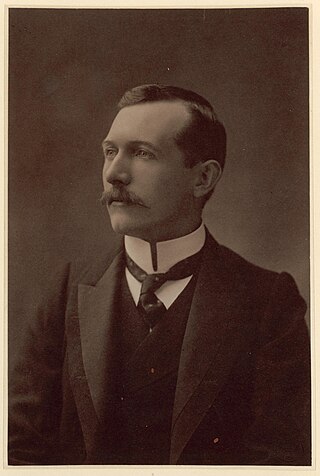Related Research Articles

Richard Fairfax Court is a former Australian politician and diplomat. He served as Premier of Western Australia from 1993 to 2001 and as Australian Ambassador to Japan from 2017 to 2020. A member of the Liberal Party, he represented the Perth-area electorate of Nedlands in the Western Australian Legislative Assembly from 1982 to 2001. His father, Sir Charles Court, also served as state premier.

Frank Wilson, was the ninth Premier of Western Australia, serving on two separate occasions – from 1910 to 1911 and then again from 1916 to 1917.

Colin James Barnett is an Australian former politician who was the 29th Premier of Western Australia. He concurrently served as the state's Treasurer at several points during his tenure and had previously held various other portfolios in Western Australia's Court–Cowan Ministry.

Joseph Peter Gardiner was the Labor Party member for the Western Australian Legislative Assembly seat of Roebourne from 1911 to 1915. His sudden and still unexplained departure from Western Australia in 1915 was an important factor in the collapse of John Scaddan's Labor government.

John Scaddan, CMG, popularly known as "Happy Jack", was Premier of Western Australia from 7 October 1911 until 27 July 1916.

John Thomas Lutey was the Labor Party member for the Western Australian Legislative Assemblyrepresenting the seat of Brownhill-Ivanhoe from 1917 to 1932.

Edward Bertram Johnston, known as Bertie Johnston, was the Western Australian Legislative Assembly member for Williams-Narrogin from 1911 to 1928, and a Senator from 1929 until 1942. His resignation from the Australian Labor Party in 1915 made possible the defeat of John Scaddan's Labor government in Western Australia.
The Electoral district of Brown Hill-Ivanhoe was a Legislative Assembly electorate in the state of Western Australia. It covered part of the Goldfields city of Boulder, near Kalgoorlie, and neighbouring mining areas. It was created at the 1911 redistribution out of the former seats of Brown Hill and Ivanhoe, and was first contested at the 1911 election. It was abolished in the 1948 redistribution, with its area split between the neighbouring electorates of Boulder and Hannans, taking effect from the 1950 election. The seat was a very safe one for the Labor Party.

Edward Ernest Heitmann, was an Australian politician and member of the Western Australian Legislative Assembly from 1904 to 1917, then a member of the Australian House of Representatives until 1919.

Philip Collier was an Australian politician who served as the 14th Premier of Western Australia from 1924 to 1930 and from 1933 to 1936. He was leader of the Labor Party from 1917 to 1936, and is Western Australia's longest-serving premier from that party.

Sir John Waters Kirwan, KCMG was the President of the Western Australian Legislative Council and first Federal member for Kalgoorlie in the Australian House of Representatives.

James Gardiner was an Australian politician who served in the Legislative Assembly of Western Australia from 1901 to 1904 and from 1914 to 1921. He served as colonial treasurer under two premiers, Walter James and Henry Lefroy. Gardiner was also the inaugural state leader of the Country Party from 1914 to 1915, and briefly served as Speaker of the Legislative Assembly from March to June 1917.
The Western Australian National Party, officially known as the National Party of Australia (WA) Inc, and branded as Nationals WA, is a political party in Western Australia. It is affiliated with the National Party of Australia, but maintains a separate structure and identity. Since the 2021 state election, the Nationals have been the senior party in an opposition alliance with the WA Liberal Party in the state parliament.

Elections were held in the state of Western Australia on 3 October 1911 to elect 50 members to the Western Australian Legislative Assembly. The Labor Party, led by Opposition Leader John Scaddan, defeated the conservative Ministerialist government led by Premier Frank Wilson. In doing so, Scaddan achieved Labor's first absolute majority on the floor of the Assembly and, with 68% of the seats, set a record for Labor's biggest majority in Western Australia. The record would stand for nearly 106 years until Labor won 69% of seats at the 2017 election. The result came as something of a surprise to many commentators and particularly to the Ministerialists, as they went to an election for the first time as a single grouping backed by John Forrest's Western Australian Liberal League, under a new system of compulsory preferential voting and new electoral boundaries both of which had been passed by Parliament earlier in the year despite ardent Labor opposition.
This is a list of members of the Western Australian Legislative Assembly between the 1914 election and the 1917 election, together known as the Ninth Parliament. The re-election of Premier John Scaddan's Labor Government with a 26-24 majority in 1914 was tempered when, a year later, Labor member Joseph Gardiner's seat was declared vacant on account of his non-attendance and a Liberal was elected in his stead, and Labor became a minority government when on 18 December 1915, Edward Johnston resigned from the Labor Party and became an independent. On 27 July 1916, the Scaddan Ministry was defeated and the Liberals' Frank Wilson became the new premier.

Williams was an electoral district of the Legislative Assembly in the Australian state of Western Australia from 1890 to 1950.
Rufus Henry Underwood was an Australian politician who represented the Western Australian Legislative Assembly seat of Pilbara from 1906 until 1924. Initially active in the Labor Party and a minister without portfolio in the Scaddan Ministry, he left the party during the conscription crisis in 1917 and thereafter represented the National Labor Party for the rest of his political career.

William Dartnell Johnson was an Australian politician who was prominent in state politics in Western Australia for most of the first half of the 20th century. A member of the Labor Party, he served in the Legislative Assembly on three occasions – from 1901 to 1905, then again from 1906 to 1917, and finally from 1924 until his death. Johnson was elected leader of the Labor Party in October 1905, but three weeks later lost his own seat at the 1905 state election. He had previously been a minister in the government of Henry Daglish, and later returned to the ministry under John Scaddan. Towards the end of his career, Johnson also served just under a year as Speaker of the Legislative Assembly, from 1938 to 1939.

Sir Walter Dwyer was an Australian lawyer, politician, and judge. He was a member of the Legislative Assembly of Western Australia from 1911 to 1914, and later serving as the presiding judge on the State Court of Arbitration from 1926 to 1945.

Sir Norbert Michael Keenan QC was an Australian lawyer and politician who was a member of the Legislative Assembly of Western Australia from 1905 to 1911 and again from 1930 to 1950. He was the leader of the Nationalist Party from 1933 to 1938, during the time when it was the junior partner in the coalition with the Country Party. Keenan had earlier served as a minister in the government of Newton Moore and the second government of Sir James Mitchell.
References
- ↑ "NEVANAS COMMISSION". Western Argus (Kalgoorlie, WA : 1916 - 1938) . Kalgoorlie, WA: National Library of Australia. 19 December 1916. p. 24. Retrieved 6 May 2012.
- ↑ "THE NEVANAS CONTRACT". Western Mail (Perth, WA : 1885 - 1954) . Perth, WA: National Library of Australia. 13 July 1917. p. 27. Retrieved 6 May 2012.